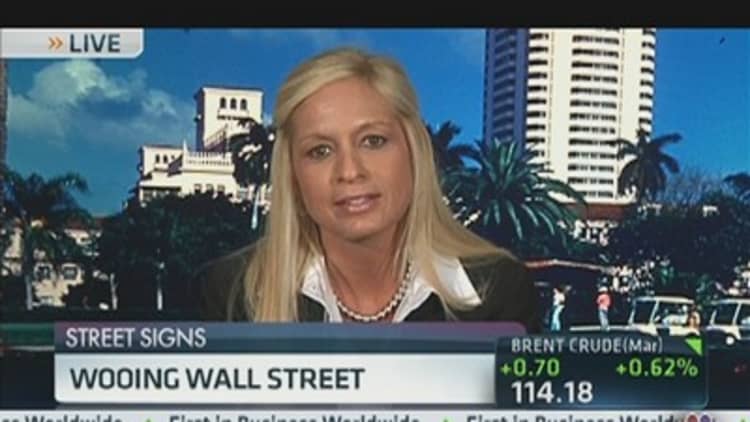The pitch for running a hedge fund from Miami or Palm Beach is hard to ignore, especially after another brutal Northeastern winter.
Taxes are low, slick offices are cheap, there's easy access to wealthy retirees and Latin American markets, and perks like good schools and ocean-front villas abound—not to mention virtually eternal sunshine.
"It's just a different quality of life," said Kelly Smallridge, who has been recruiting asset-management firms from the New York area as CEO of Palm Beach County's Business Development Board. "People spend an entire lifetime of working to retire to come to Florida, when you can actually earn a living in Florida and live in this environment year-round." (Tweet this)
A sunny pitch
Smallridge and counterparts in Miami have aggressively pushed that argument in recent years in a bid to recruit investment managers to South Florida.
Business development teams have traveled to Manhattan; Greenwich, Connecticut; and Boston to pitch. Florida Governor Rick Scott has called portfolio managers to make the case. When prospects are ready to visit, they're taken on "red carpet" tours, complete with an airport pickup, lunch at a yacht club and trips to local private schools and office spaces.
Read MoreNext billion-dollar unicorns won't be from the US
The efforts have helped prod several big hedge fund moves. They include $6 billion Universa Investments, which relocated from California, and new satellite offices opened by $13 billion SkyBridge Capital, $10 billion RWC Partners and Affiliated Managers Group, which runs $638 billion through stakes in hedge fund managers like AQR, Blue Mountain and ValueAct. The number of private fund managers registered in Florida has also increased materially since 2013.
Still, investment firms are hardly moving en masse to Florida, and the state counts few private fund managers that run $1 billion or more. In short, observers say it's hard to call Miami the "next Singapore" or "Wall Street South" as some have suggested.
"Despite the best efforts of various local development interests and certain periodicals pumping a false trend, there is no danger of a hedge fund migration to Florida," said Omeed Malik, the New York-based head of U.S. prime brokerage sales at Bank of America Merrill Lynch.
"New York City," Malik added, "has and always will be the epicenter of the financial industry, and neither sun nor subsidies will ever change that."

To be sure, the region's stable of registered investment advisors has grown.
There are now 500 money-management firms headquartered in Florida that run hedge, private equity, venture capital or other funds that are closed to the average investor, according to data compiled by Convergence, which analyzes public filings. That's up from 349 in May 2013 and 408 in May 2014.
A more specific breakdown of what types of firms the numbers represent or how many had moved from out of state was unavailable. Private asset managers are also relatively difficult to define and track, especially smaller ones, making it difficult to quantify their rise in the region.
According to a recent tally by communications firm Newlink Group, South Florida is home to 60 hedge funds, 19 private equity firms and more than 200 family offices. Together about $300 billion is managed by the private-wealth industry in South Florida.
By comparison, New York-based hedge fund firms alone controlled $1.14 trillion as of January, according to HedgeFund Intelligence's ranking of firms running at least $1 billion. New York is followed by Connecticut ($225 billion), Massachusetts ($156 billion) and California ($140 billion). (The totals would be much higher if smaller fund managers and private equity and venture capital funds were included.)
Read More Druckenmiller in Palm Beach: This could end 'very badly'
Some big moves
A few Florida newcomers have attracted attention.
Universa moved its headquarters from Santa Monica, California, to Coconut Grove last March. Firm founder—and libertarian—Mark Spitznagel cited a "more hospitable business and tax environment" in explaining the move to the Miami area. He also noted the city's proximity to Latin America and Europe and its access to international investors.
Another to come is Eddie Lampert's $3.7 billion ESL Investments, which moved from Greenwich to Bay Harbor Islands, near Miami, in June 2012. Lampert did not comment on the move, and a message left with the firm was not returned.
Other recent arrivals touted by Palm Beach County and the Miami Downtown Development Authority, which launched a "Finance Sector Initiative" in October of 2013, include:
- RWC Partners, a U.K. asset manager that opened a Miami office in April to run an emerging markets hedge fund and long-only strategy using a local team it hired from Everest Capital.
- SkyBridge Capital, a New York-based hedge fund of funds that opened a Palm Beach Gardens office in March 2015 (the firm is also the title sponsor of the city's first-ever bike share program, "SkyBike").
- Scout Ventures, a New York-based venture capital firm that opened its first satellite office in Miami in September to source local technology sector deals.
Read MoreHedge fund Everest Capital falls off a Swiss cliff
Marc Sarnoff, a lawyer and Miami city commissioner who helps lead the effort to recruit firms as chairman of the DDA, called the effort "a work in progress."
But Sarnoff said that local officials are in discussions about moving with several large New York-area firms and that interest is only set to grow, given what he called policies unfriendly to money managers in New York.
"We actually have a PAC down here with $1 million in it to make sure he gets reelected," Sarnoff joked about a political action committee to help progressive Mayor Bill de Blasio. "We think he has set the fertile grounds for the movement."
Smallridge called the effort a success and said her office consistently receives inquiries from interested private fund managers, although not quite as much as when the effort launched three years ago.
Not a new idea
Some have long seen the value of living in Florida.
Boca Raton-based III Capital Management, for example, moved from Chicago in 1984, despite a name that technically stands for Illinois Income Investors.
"The winter was quite cold, and so the decision was made that we could manage capital anywhere, so we looked into where the Gulf Stream of the Atlantic Ocean met the Eastern Seaboard of the U.S.," said Robert Printz, co-head of investor relations at the $3.6 billion money manager. "The answer was West Palm Beach."
Other firms already based in South Florida include hedge fund investor Lighthouse Partners, hedge fund Otter Creek Management, private equity firm Sun Capital Partners, and hedge and mutual fund manager Fairholme Capital.
Some investment managers already have second homes in Florida but are not full-time residents. That fact is what started the Palm Beach effort in late 2011 to lure more of them into living in Florida full time, according to Smallridge.
While Palm Beach has long been a wealthy enclave, Miami is growing as a hub for the rich, especially those from Latin America.
A recent Knight Frank study found that Miami ranked sixth on a survey list of "most important" cities to ultrahigh-net-worth individuals (London was first; New York was second).
Still, Miami had just 229 people with $30 million or more in assets, according to Knight Frank, compared to 3,008 in New York and 969 in Los Angeles.
Read MorePaul Tudor Jones buys $71 million Palm Beach estate
Bargain beachfronts
Office space is certainly less expensive in South Florida.
The asking price for premier commercial space, called Class A, is about $43 a square foot in West Palm Beach's business district and downtown Miami, according to real estate brokerage Cushman & Wakefield. That compares to about $91 in Greenwich, Connecticut, and around $100 in midtown Manhattan's East Side.
"Asset managers who run $1 billion plus are less concerned about the cost of office space then they are on proximity to talent, investors, and peers," said Jonathan Luttwak, co-head of global alternative investment services at Cushman & Wakefield. "Florida is cheaper, but there are lots of other factors."
Bank of America's Malik also brought up the staffing issue.
"The reality is that if you are starting or running a hedge fund, some of the best talent is found in the NYC area," he said.
Sarnoff and Smallridge emphasized that there is enough personnel in the area to keep hedge funds happy even if there is a smaller population than in New York or Connecticut.
"This is one of the most attractive places that the talent in New York wants to move to, to get out of that race up there," Smallridge said.




